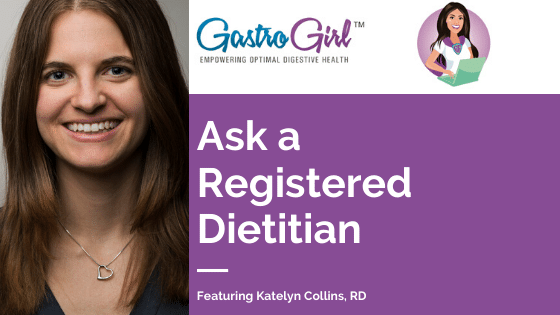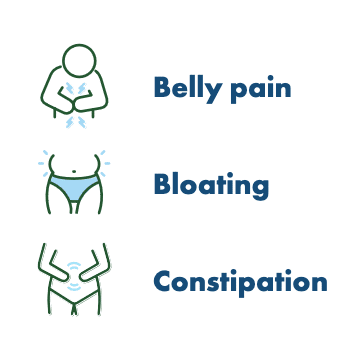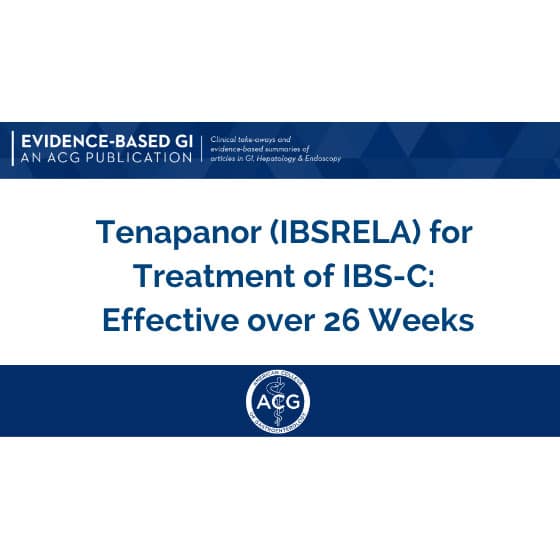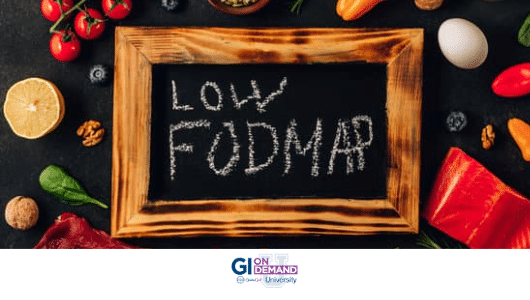Ask A Registered Dietitian: Why is My Keto Diet Making My IBS Symptoms Worse?
Gastro Girl’s “Ask A Registered Dietitian” is a regular series featuring common questions answered by registered dietitians with expertise working with patients living with various digestive health symptoms and conditions. This week, Katelyn Collins, RD , a registered dietitian specializing in irritable bowel syndrome (IBS) and digestive health, provides insight on the Keto diet and IBS.
Question: Why is my keto diet making my IBS symptoms worse?
If you have irritable bowel syndrome (IBS), you are willing to try anything in order to get in control of your symptoms. You are no stranger to dietary changes and have likely done your fair share of internet research while on the quest for answers.
These days, it’s hard to browse the internet without hitting the ketogenic diet, or keto diet for short.
The keto diet is very low in carbohydrates, very high in fat, and moderate in protein. It’s being hailed as a cure-all for everything from anxiety to diabetes; and social media pages are filled to the brim with stories about its health benefits. While some of these claims may have merit, the diet is certainly not appropriate for everyone. In fact, it may actually trigger your IBS symptoms!
Let’s take a closer look at the keto diet to find out why it may not be a good fit for those with IBS.
Soluble fiber is usually lacking
We all know that the standard advice to simply “drink more water and eat more fiber” is not a magic cure for IBS. That being said, changes in the types and amount of fiber you eat can influence your IBS symptoms.
Research suggests that a specific type of fiber called soluble fiber may help improve IBS symptoms. Soluble fiber is found in many high-carbohydrate foods such as beans, oats, carrots, and sweet potatoes. While there are some keto-friendly sources like avocados and flax seeds, it can be challenging to get enough soluble fiber from low-carb sources alone.
Some lactose is allowed
Does ice cream or a cold glass of milk have you running for the hills because of your IBS? You’re not alone. Research shows that people with IBS, especially diarrhea-predominant IBS (known as IBS-D), are often lactose intolerant.
While you won’t be eating a lot of ice cream while on keto, dairy products such as cheese and full-fat Greek yogurt can all fit into the diet. If you are lactose intolerant, these foods may be triggering your symptoms.
Cauliflower is a staple food
Since the keto diet restricts high-carbohydrate foods like bread and rice, recipe bloggers and food companies have been coming up with ways to create keto friendly replacements.
One trendy option is to use cauliflower as a replacement for, well, everything! Not only can you find cauliflower rice in most frozen food aisles, cauliflower is now also being used to make mashed potatoes, pizza crust, and even pasta.
What you may not realize, is that cauliflower is high in a type of carbohydrate called mannitol that can increase IBS symptoms.
Too many FODMAPs
If you have IBS, you have likely heard of the low FODMAP diet. It’s a temporary elimination diet that restricts foods high in FODMAPs (short for fermentable oligosaccharides, disaccharides, monosaccharides, and polyols). Research shows that the low FODMAP diet can help improve IBS symptoms and it is currently one of the most popular diets for IBS.
While the ketogenic diet does restrict certain high FODMAP foods like wheat and beans, it also emphasizes many high FODMAP foods. Remember the lactose and the mannitol we talked about already? Both of those are considered FODMAPs.
The keto friendly vegetables in your diet may also be adding to your symptoms. High FODMAP vegetables that are allowed on the keto diet include Brussels sprouts, garlic, onions, leeks, asparagus, and certain types of mushrooms.
Sugar alcohols (AKA polyols) are often used in prepackaged keto treats because they provide a sweet taste without adding carbs. But they can be a hidden trigger for those with IBS.
If you’ve increased the amount of high FODMAP foods in your diet by going keto, this could explain why your IBS symptoms are worse.
Where to go from here
If your keto diet is triggering your IBS symptoms, it’s a good idea to take a step back and review the reasons why this might be happening. If you’re feeling confused about what to eat for your IBS, working with a registered dietitian who specializes in digestive health can help you find a way of eating that works for you and your IBS symptoms.
Katelyn Collins, RD is a registered dietitian specializing in irritable bowel syndrome (IBS) and digestive health. Katelyn’s personal experience with IBS first sparked her passion for nutrition and health. Since then, she has been a vocal advocate for the digestive health community and has dedicated her own nutrition practice to serving those with digestive conditions.
Listen to our
latest Podcast!






